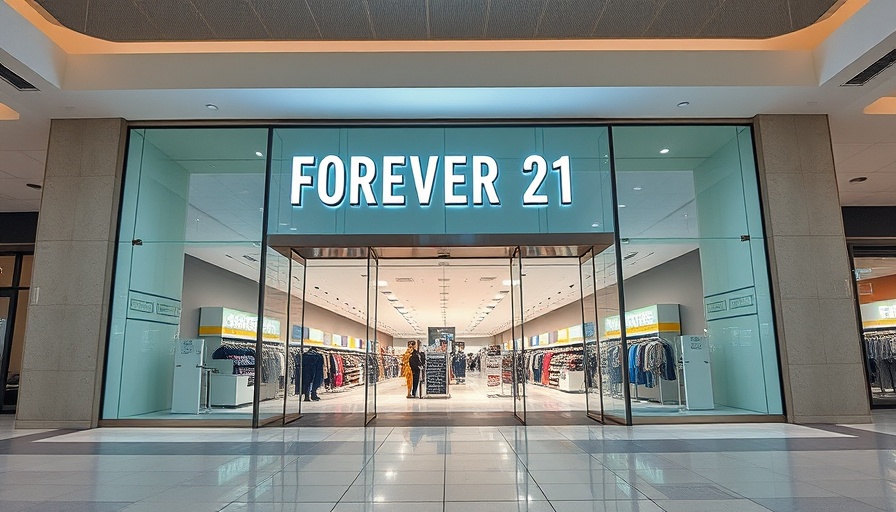
Forever 21's Bankruptcy: A Closer Look at the Impact
On March 16, 2025, Forever 21, the well-known fast-fashion retailer, filed for Chapter 11 bankruptcy, marking its second major bankruptcy in just a few years. This decision means the company will be shutting down all its U.S. stores, including eight locations in the greater Houston area. From Baybrook Mall to The Galleria, these stores have been staples for fashion-forward shoppers seeking trendy clothing at affordable prices.
Understanding the Financial Fallout
The Chapter 11 filing shows a stark reality for Forever 21, as it listed estimated assets between $100 million and $500 million against liabilities ranging from $1 billion to $10 billion. Such staggering numbers indicate a severe financial strain, leaving between 10,001 and 25,000 creditors in the lurch. CFO Brad Sell emphasized the fierce competition from foreign rivals, particularly mentioning Chinese companies like Temu and Shein, which benefit from import duty exemptions, allowing them to undercut prices.
The History of Challenges
This is not the first brush with bankruptcy for Forever 21. In 2019, the retailer entered bankruptcy only to emerge through a joint venture formed by Authentic Brands Group and Simon Property Group. The joint venture acquired the brand for $81 million, but the challenges have continued, leading CEO Jamie Salter to refer to the acquisition as “probably the biggest mistake I made.” Such sentiments reflect the ongoing turmoil in the fast-fashion sector, where staying relevant and profitable has become increasingly difficult.
Local Impact and Reactions
The closure of Forever 21 stores in Houston represents a significant shift in the local retail landscape. With locations in major malls such as Katy Mills and Pearland Town Center, many local shoppers familiar with the brand will now need to find alternate destinations for their fashion needs. Local business commentators note that the loss of these stores not only affects shopping habits but also the overall foot traffic in malls where Forever 21 had a presence.
What Does This Mean for the Future of Retail in Houston?
As an experienced journalist covering Houston business news, it’s essential to consider how this bankruptcy could affect future retail developments in the area. With a growing trend towards online shopping and competition from international retailers, local businesses may find themselves needing to adapt to new shopping patterns. The city’s retail environment is shifting, and businesses must innovate to thrive. The future will likely see a more diverse mix of stores, as some brands leave the market and others expand.
Closing Sales: Last Chance for Shoppers
Forever 21 has indicated that store closures will happen in tandem with liquidation sales, allowing customers a final opportunity to take advantage of discounts on their favorite products. While the exact closure dates are still to be determined, shoppers are encouraged to visit stores and check for updates online. Whether you’re a dedicated fan of the brand or just looking for a good deal, this is an excellent chance to shop and save before the locations close their doors for good.
Emotional Impact on Customers and Employees
The emotional toll of such a bankruptcy extends beyond financial implications. Regular customers often form attachments to their favorite retail locations, and employees find themselves facing job insecurity. The closure of Forever 21’s stores in Houston will undoubtedly lead to uncertainty among its workforce and sadness for local shoppers, who have come to rely on the brand for their fashion choices.
Navigating the Retail Landscape Moving Forward
As the dust settles from this bankruptcy, consumers and local businesses alike need to reflect on their shopping choices. Looking to the future, the emphasis on supporting local businesses could emerge as a response to the decline of major retailers. Similarly, exploring options such as small pop-up shops or online boutiques might offer fresh opportunities. In the end, how the community reacts to this significant change will shape the Houston shopping environment for years to come.
In conclusion, while the loss of Forever 21's stores in the Houston area is disheartening, it opens the door for innovation and new ventures in retail. As the fashion industry evolves, adapting to competitive challenges will be crucial for both consumers and businesses in Houston. Stay informed about the changes in your local malls and support your favorite local businesses wherever possible.
 Add Element
Add Element  Add Row
Add Row 



Write A Comment